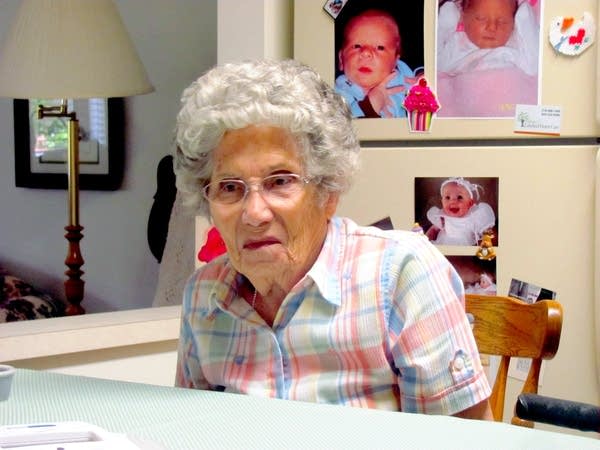Simple solutions can help fill gaps in health care
Go Deeper.
Create an account or log in to save stories.
Like this?
Thanks for liking this story! We have added it to a list of your favorite stories.

Martha Hitzeman is legally blind, and at 87, needs medication for pain and to prevent strokes.
But sometimes she forgets to take her pills.
"She was starting to miss doses, sometimes maybe four or five doses in 10 days," said her daughter, Marie Fuchs. "So I knew she wasn't getting the medication she needed."
Fuchs, who manages her mother's medication, enrolled Hitzeman last August in MedSmart, a pilot project run by PioneerCare a long-term-care facility in Fergus Falls.
Turn Up Your Support
MPR News helps you turn down the noise and build shared understanding. Turn up your support for this public resource and keep trusted journalism accessible to all.
Her mother now has a small device on her kitchen table that holds two weeks' worth of medication. The automated dispenser beeps twice a day -- and keeps beeping until Hitzeman tips it over and the pills are dispensed.

"When I hear it ringing, I do what I need to do and take my time getting out here 'cause it will ring till I get here," Hitzeman said. "It's really a wonderful convenience."
By ensuring that elderly people take medications, the simple device could allow them to stay healthy and out of the hospital or nursing home. After a year, it has proved so successful that other communities plan to start using the program.
MedSmart was created in response to a state Minnesota Department of Human Services request for ideas that could help elderly patients stay at home. It is funded in part by a $117,000 DHS matching grant.
The device is connected to a phone line, and if it isn't tipped over within an hour, Marie Fuchs will receive an automated text message.
"I was able to take a week's vacation last fall and not worry about her taking her meds every day," Fuchs said. "It gives her the independence and gives me the peace of mind that she's getting what she needs."
The MedSmart program costs patients $39 a month. Data collected during the project found the device reduced medication errors for most participants.
In Fergus Falls, there are 73 people using the MedSmart program, 40 of whom are monitored each day. On a recent week, 39 took their medication as directed 100 percent of the time.
The device won't help everyone. For some, it won't provide the level of help they need. However, the project is filling a need in the community, said Todd Johnson, a pharmacist at Lake Region Healthcare in Fergus Falls.
"I know there's a case or two where family members have said, 'you pretty much allowed my family member to maintain independent living, when they weren't able to do that before,' " he said. "Non compliance, especially with chronic disease medications, or just not taking them properly or running out of them is a major cause of re-admissions, clinic visits."
"...How valuable is that medication if they're not taking it?"
There are a number of devices on the market that dispense medication, but what makes the Fergus Falls project unique is that it's not just about technology, said Karen Wulfekuhle, director of home and community services for PioneerCare. It provides a local team of health professionals who decide on the best solution for individual patients, she said.
Wulfekuhle is trying to convince insurance providers to pay for the medication reminder. She said it's not unusual for insurance to pay hundreds of dollars a month for drugs a patient needs.
"The argument is, how valuable is that medication if they're not taking it? A $39 a month charge for a machine that helps support their health - [it] makes sense to cover that expense if in turn it's going to keep them out of the hospital," she said.
Since 2003, DHS officials have awarded 400 grants to organizations that help fix health care gaps for the elderly according, Jean Woods, director of the department's aging and adult services division.
The grants cover a variety of community based projects. An earlier grant helped establish an electronic monitoring program for seniors in Fergus Falls. Another grant trained Somali volunteers in the Twin Cities to check on elders and perform basic home chores. In Aitkin County, a grant funds a volunteer program to add safety equipment to the homes of senior citizens to reduce falls.
"Minnesota has been very intent and very purposeful about wanting to make sure people, wherever they live in the state, can stay home and be served through home and community-based services," Wood said.
DHS officials awarded $2.3 million in grants during the 2012 fiscal year. The funding is appropriated each year by the legislature. The department tracks grant projects for five years. More than 90 percent become self sustaining, Wood said.
Dear reader,
Your voice matters. And we want to hear it.
Will you help shape the future of Minnesota Public Radio by taking our short Listener Survey?
It only takes a few minutes, and your input helps us serve you better—whether it’s news, culture, or the conversations that matter most to Minnesotans.





